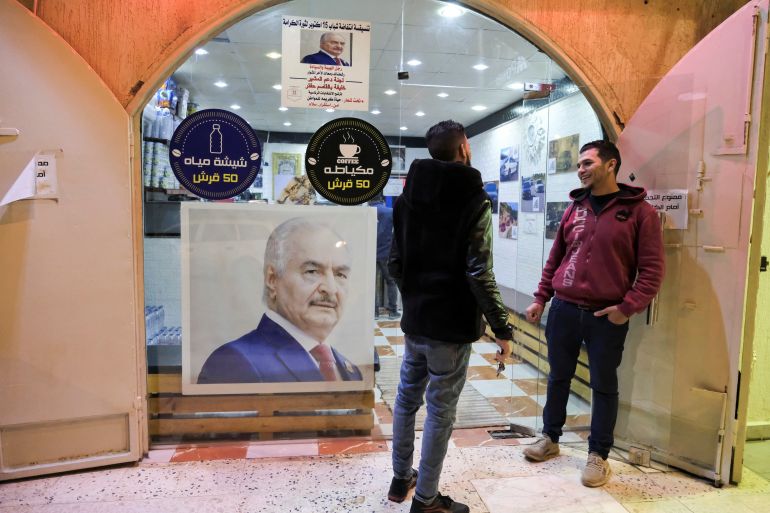In Libya, anger and uncertainty after polls delayed
Libyans express frustration after presidential election scheduled for December 24 was indefinitely pushed back.

Libyans have reacted with a mix of anger and hopelessness after authorities announced the postponement of a crucial presidential election initially scheduled to take place on Friday.
The electoral commission on Wednesday suggested the vote – aimed at ending a decade of chaos in the country – be pushed back by a month, owing to a lack of preparedness and disagreements between various political forces on the legal basis of the poll.
Keep reading
list of 3 itemsLibya electoral board suggests January 24 for polls
Has the political process in Libya failed?
Mohammed al-Wafi, a resident of the capital, Tripoli, could not hide his dismay as he affirmed that the Libyan people were “thirsty” for the elections.
“We refuse to postpone the elections. I am talking about the opinion of the entire Libyan street. We, as citizens of the south [region], support holding the elections on time, frankly,” al-Wafi said.
The electoral board has suggested pushing the vote back by a month to January 24, but given the animosity between the eastern-based parliament and authorities in Tripoli, agreeing on a new date will be far from easy.
Some 2.5 million Libyans had collected their voter cards, out of a population of seven million.
But the vote has been made complicated by a deepening rift between the rival leadership that emerged in the country’s east and west following the NATO-backed uprising that removed longtime ruler Muammar Gaddafi in 2011.
To start with, there is Speaker Aguila Saleh’s insistence that Libya first proceed with a presidential vote before parliamentary elections can take place.
Critics hold that Saleh, who heads the eastern-based House of Representatives and is running for president, views the vote as a winner-take-all contest.
This is a prospect that has unsettled many Tripoli residents, including Ahmed Baiyed, who said the vote could have resulted in a president whose powers would be ambiguous in the absence of a constitution.
“I’m happy the presidential elections aren’t happening. To hold elections, you have to have a foundation. Our foundation is a constitution,” Baiyed told Al Jazeera.
“If we don’t have a constitution that identifies what kind of governing system we have, and the powers a president has, how can we vote for a president?”
This was a view shared by Othman al-Amari, who regretted that parliament has been unable to deliver after many years in power.
“We need to have parliamentary elections first, and then a presidential one,” he said. “The parliament has been in power for several years and they haven’t done anything.”
And then there were disagreements over who should be allowed to run in the election.
The three most prominent candidates – Khalifa Haftar, Saif al-Islam Gaddafi and Abdul Hamid Dbeibah – were also the three most divisive.
Haftar was unacceptable to many in western Libya after his 2019-20 assault on Tripoli that smashed parts of the capital. Gaddafi, the son of the former ruler, was convicted of war crimes by a Tripoli court and is detested by many of those who fought in the 2011 revolt.
Dbeibah, the interim prime minister, had promised when he was installed to the post that he would not run in an election. His continued work as prime minister in the run-up to the vote led many of his rivals to say he had an unfair advantage.
Hopes dashed
The delay is another setback in Libya’s interminable transition, after 42 years of one-man rule and a decade of civil war.
The era under Muammar Gaddafi from 1969-2011 was marked by brutal repression, but Libyans did benefit from a generous welfare system paid for by revenues from Africa’s biggest oil reserves.
But the revolt that toppled Gaddafi turned into a complex war dragging in mercenaries and foreign powers. The country’s infrastructure and economy steadily degraded, with electricity cuts and runaway inflation becoming the norm.
In Tripoli, Dbeibah’s interim government has been working to sign reconstruction contracts and revive the city, heavily damaged by Haftar’s 2019-2020 attack.
Were those efforts all in vain?
Businessman Ibrahim Ali-Bek believes war could easily break out again.
If it does, “normal citizens will pay the price”, he said.
At the other end of the country in Benghazi, the birthplace of the uprising against Gaddafi, residents face similar problems.
Engineer Mohamed El-Jadi says he took part in the uprising in the hope of “more freedom and prosperity”.
El-Jadi said he was disappointed by the delay in the elections.
“Our standard of living has dropped, our salaries haven’t changed despite inflation and we’re living in an unstable environment,” he said.
“The main players in the conflict, who mostly then decided to stand in the elections, knew they had little chance of winning. That’s why they disrupted it,” he said.